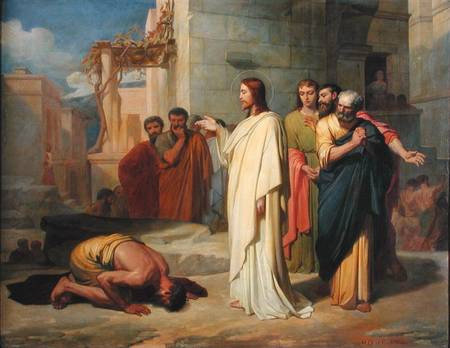Genesis 14:18-20
Psalm 110: 1, 2, 3, 4
1 Corinthians 11:23-26
Luke 9:11b-17
At the end of today’s Gospel reading, we are left with an unmistakable image of abundance: “They all ate and were satisfied. And when the leftover fragments were picked up, they filled twelve wicker baskets.” What began as a logistical crisis – How will five thousand people be fed?!?! – ends with a new, happier problem: What should we do with all of these leftovers?
Perhaps the most natural question that arises from this story is “How did this happen?” or “How did Jesus do it?” Traditionally, this story has been understood to be one of the proofs of the Divinity of Jesus. By use of supernatural powers, Jesus transformed five loaves and two fish into enough food to feed five thousand people. In recent centuries, some Christians have sought to “demythologize” the Gospel by suggesting that there was no supernatural multiplication of loaves and fish; the people had sufficient food with them all along and merely needed to be convinced by Jesus and his disciples to share what they had. I am not interesting in trying to resolve that debate. Instead, I want to offer two brief reflections on scarcity and abundance.
This Sunday’s second reading should sound familiar. The very same passage was proclaimed not long ago on Holy Thursday, another occasion when we pray and reflect on the Eucharist. What was left out on Holy Thursday and for this Feast of Corpus Christi, however, is the context in which Paul wrote these words that speak of the institution of the Eucharist. In 1 Corinthians 11:17-22 (which immediately precedes the passage proclaimed today), Paul admonishes the Corinthians because some members of their community were unable to share in a common meal that accompanied the celebration of the Eucharist. It seems that it was the poor who were excluded. “So, when you meet together, it is not the Lord’s Supper that you eat; for when the eating begins, each one of you has his own supper first, and there is one going hungry while another is getting drunk. …Have you such disregard for God’s assembly that you can put to shame those who have nothing”? According to Paul, our celebration of the Eucharist is rendered invalid if we fail to allow the poor to share in the abundance of the community. By linking 1 Corinthians to the story of the feeding of the five thousand, the Church today also makes a connection between the Eucharist and the community’s responsibility to give food to those who lack any thing to eat (Jesus tells the disciples, “Give them some food yourselves”).
The economist Charles Clark has written very convincingly about the importance of basing our relationships and the structures of our society on principles of abundance rather than scarcity (see Rediscovering Abundance). He notes that we tend to see wealth in inherently private and individualistic terms. We see wealth as something scarce and we assume that something becomes more valuable when it is rare rather than widely shared. We assume that we live in a world of scarcity where there cannot possibly be enough to go around. This can lead to selfishness and to hoarding out of fear or greed. Rather than putting what we have to use for the common good or giving our surplus to the poor, we hold on to what we have more tightly and focus our attention on ensuring that we and those we love have enough. Today’s Gospel calls us to think and live differently.
On quite a different note, I cannot help but make a connection between the emphasis on abundance in today’s Gospel and the abundance of grace the comes to us in the Eucharist. It has been well over a year since we began following the new Roman Missal. It has started to become second nature for me to say “and with your spirit” instead of “and also with you.” But I wonder whether I will ever get used to hearing “Take this, all of you, and drink from it: for this is the chalice of my Blood, the Blood of the new and eternal covenant, which will be poured out for you and for many for the forgiveness of sins” instead of “It will be shed for you and for all so that sins may be forgiven.”
A good deal of actual and virtual ink has been spilled to explain why “Pro Multis” has been translated in this new way. But honestly as I reflect on this Feast of the Most Holy Body and Blood of Christ, I find that this new language is not well suited to convey the great abundance of grace the comes from the death and resurrection of Jesus Christ that we remember and experience in this sacrament.
Today’s Gospel story comes right after Herod asks, “So who is this I hear such reports about” (Lk 9:9) and right before Jesus asks his disciples, “Who do you say that I am?” (Lk 9:20). The story tells us that this is Christ, who feeds the multitudes and yet has more to give; this is Christ who offers his body and his blood. May we be moved by his example.



Trackbacks/Pingbacks